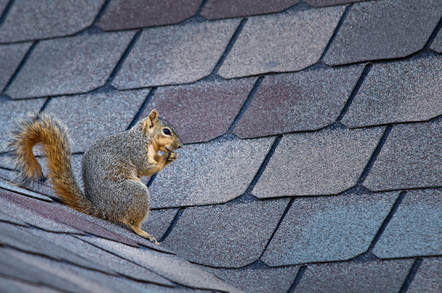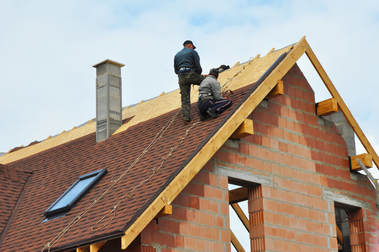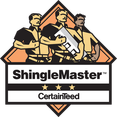|
Your home's roof is the first line of defense in extreme weather. Waiting until the first sign of damage appears in the ceiling or roof could mean facing much larger problems. Early detection of roof leaks or other damage is the answer to avoiding more serious roof damage in the future. Having your roof periodically inspected can avoid costly repairs.
According to Angie's List, their researchers found that roof inspection costs range from free to $200. If you just want to check the condition of your roof, you'll probably have to pay for a general maintenance inspection. Sometimes an inspection may include some minor repairs. Also some inspectors charge more to include an interior, attic-view roof check. Scheduling a "peace of mind" roof inspection every one or two years can catch potential roofing problems before they become bigger. Oftentimes it is helpful to get a professional estimate of how much useful life your roof might have left. Even if there are repairs required, it could save you the cost of replacing your roof by extending the life of your old one. Here are some things an inspector will examine:
Also, treatment for moss and lichen needs to be initiated in the fall so that it can be completed by the next spring. The treatment can be working during the winter months and the dead lichen can be swept or rinsed off in the spring. If you feel that your roof has been compromised or for seasonal inspections, especially if your roof is over ten years old, call your insurance company. They may cover the cost of repairs and your agent will arrange for a qualified roof inspector to examine the roof and make a determination. A roof inspection gets broken into four facets: structure, materials, interiors, and workmanship.
If you found this information helpful, please click "like" and "share" below. How to Ensure Your Roofer Uses Quality Materials
Using the right roofing material for your home can improve its curb appeal as well as protect your home's first line of defense in severe weather. Your choice of roofing shingles can help your home stand out or blend in with your surroundings. When getting quotes from roofing companies, you will find that the prices from each will vary. Part of this variation in price is based on the supplier from which the roofing company gets their materials. The higher quality the roofing material, the higher the quote will be. Sometimes paying a little more can go a long way. The design, ability to protect, and quality of engineering of your roofing shingle will be factors in your choice. According to hgtv.com, when choosing roofing materials, consider the following questions:
When doing a full replacement of your roof, it is always better to strip it down to the sheathing so the roofer can check for mold, rot, water damage, and insect damage. This also prevents the roofer from double-layering the shingles and causing it to overstress the rafters or supports of your home from the weight. Checking the manufacturer's warranty of the roofing materials to make sure it covers the overstress of rafters and other structural parts of the home is a good way to check the quality of the material. Most full coverage warranties cover defective materials and most material warranties offer prorated coverage. However, most to all warranties do not cover wind damage over 85 mph or faulty installation. To protect yourself from faulty installation, ask for a labor warranty and save all receipts and invoices. Checking the fire rating of the material being used is another way to verify the quality of the material being used. You want to get material that has a Class A fire rating. This is the highest rated material in fire safety. Here are some of the most popular choices for roofing materials along with the pros and cons for their use and the estimated cost and life span of that product: ASPHALT SHINGLES: Asphalt is the most popular shingle used. It is light-weight, easy to install and the most budget friendly. these shingles can be reinforced with fiberglass or organic materials (cellulose). There are two types of asphalt shingles. Laminated asphalt shingles look like slate or wood shakes. Three tab asphalt shingles are single layer, flatter/thinner, but perform poorly in past tests. Pros: Asphalt comes in a variety of colors, is widely available is one of the least expensive materials. Cons: Asphalt has a shorter life span, doesn't provide as much insulation as other materials available and the quality can vary. Cost and life span: Homeowners will pay from $70 to $120 a square and if maintained, will last 20 to 25 years. CLAY AND CONCRETE TILES: These tiles add texture and style to a roof. Flat, ribbed or scalloped clay tiles are durable but also very heavy and must be professionally installed. concrete tiles are less expensive but also have heavy weight. Pros: Concrete and clay ties are long lasting, non-combustible, and concrete tiles are energy efficient. Cons: Clay and concrete tires are expensive, heavy and most often require additional framing. Cost and Life Span: Prices start around $300 to $500 a square and, if maintained will last 40 to 50 years. METAL ROOFING: Metal roofs are resistant to severe weather and are available in two types, panels and shingles. They come in aluminum, copper, stainless steel and zinc. Pros: Metal roofing is durable, longer-lasting and has high solar reflectance. This allows your home to stay cooler in the summer. Cons: Metal roofing can be expensive. this type of roofing can be noisy during rainstorms and can dent easily. Cost and Life Span: Prices start around $100 to $300 a square and can last 40 to 75 years. SLATE: Beautiful and with a distinctive appearance, slate colors include black, green, grey, red and purple. Fake slate is produced in plastic/polymer, clay and rubber, or asphalt. This material is much more slippery than real slate and may crack upon impact. Pros: Slate is durable, fire-resistant and can be recycled. Cons: Slate is heavy, usually requires extra framing and needs to be professionally installed. Imported slate quality can vary. Cost and Life Span: Prices start at $600 a square and up. It can last from 50 to 100 years or more. WOOD SHINGLES AND SHAKE: This is an extremely popular choice because homeowners love the look and the shingles weather to a pretty shade of gray. Wood shakes are handmade and a bit rougher- looking than wood shingles which are machine-made. Pros: these shingles offer a rustic look and are usually made from cedar, redwood and southern pine. Cons: In some areas fire codes prohibit use. These can mold, split or rot in wet climates. Cost and Life Span: Prices start at $100 to $150 a square and last around 25 to 30 years. SYNTHETIC ROOFING PRODUCTS: These include rubber, plastic, and polymer roofing which can give you the color, look and texture of natural materials like slate and wood. Pros: Synthetic roofing products are designed to be strong and easy to maintain and are fire-resistant. They are often not as fragile, heavy, or expensive as natural products. Cons: Some of theses products can absorb water, the quality varies and are not as time-tested as other materials. Cost and Life Span: Prices start about $300 a square and are warrantied for up to 50 years: The National Roofing Contractors Association (NRCA) suggests you look at full-size samples of the synthetic product and the manufacturers' brochures. Also, look for installations that have been in place at least 10 years to see the wear characteristics for your area. Finding the type of shingle that your budget will allow is step one. Researching the supplier's warranties for that product would be step Two. The cheapest quotes may not always be the best quote, because they are partially based on material cost and quality. Joye Roofing offers a variety of materials and prices to fit any homeowners's needs. They offer a free roof inspection and are 5-star rated on Facebook and Google My Business. If you found this information helpful, click the "like" and "share" buttons below. |
AuthorDerek Joye has been roofing homes and businesses in the Midlands for over 20 years. Archives
June 2020
Categories
All
|



 RSS Feed
RSS Feed



